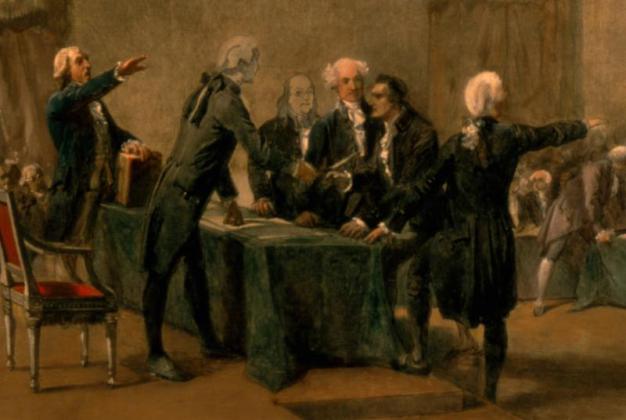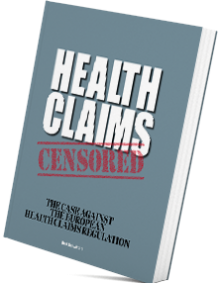In the period before the American Revolution, the Americans considered themselves Englishmen and King George their King. Their qualms were not so much with the King as with the British Parliament, which resisted tooth and nail representation of their fellow “American” Englishmen. For the British MP’s, the colonies were considered as worthy of being taxed, but unworthy of co-determining who or what would be taxed, how much tax would be levied and for what purpose it would be used. Great Britain acted as sovereign over all its colonies, including the 13 States that had taken shape on the East coast of the American continent.
The Englishmen living in America held the view that they were deprived of the historic right laid down in the (English) Bill of Rights, per which no Englishman could be taxed without the tax having been approved by Parliament. Since the Englishmen living in America were not represented in the British Parliament, they resisted taxation. The words “taxation without representation is tyranny” find their origin in Ireland, which the British also treated as a colony before the American States underwent the same fate. In 1750, the phrase was used for the first time on American soil in a sermon given by Jonathan Mayhew. On the 4th of July 1776 the American Englishmen had enough of it and representatives of the 13 American States signed the Declaration of Independence.
Nearly 200 years earlier, on the 26th of July 1581, the Dutch had done a similar thing. In the “Akte van Verlatinghe,” (Act of Abjuration) the Dutch provinces of the Spanish Kingdom declared their independence of King Philip II and left his Kingdom. On and off, the ensuing Dutch revolutionary war took 80 years. The Dutch Republic, the first republic in the world, was the great result. It organized and restored the local freedoms established during the Middle Ages, freedoms that had been repealed and usurped by the King of Spain.
The American revolution lasted “only” 8 years, from 1775 until 1783. It resulted in the Republic of the United States of America, a Constitution and accompanying Bill of Rights that established and carefully preserved the basic freedoms and unalienable Rights laid down in the Declaration of Independence: Life, Liberty and the pursuit of Happiness.
In 2006, the European Community enacted the Nutrition and Health Claims Regulation (NHCR). By way of it, the European Community took full control of such claims, when made in commercial communication. All claims were prohibited ab initio and only the claims that have succesfully undergone the Community authorization process are allowed as part of commercial communication. On the 16th of May 2012, the enactment of Regulation 432/2012/EC, which established a preliminary list of authorized health claims, activated the prohibition and set in motion a 6 months transitional period during which all the non-authorized claims could still be used. For food business operators located in the European Union and for non-EU business operators exporting their foods to the EU, the freedom of speech died in 2006. It was officially buried in 2012.
Under the NHCR, all that was left for the operators was the task to provide the justification (substantiation) of the claim and carry the costs of the justification. (see also previous blog: The Scientific Basis of the NHCR.) Article 6.2 of the NHCR provides that “a food business operator making a nutrition or health claim shall justify the use of the claim.” This paragraph is preceded by the requirement that all “nutrition and health claims shall be based on and substantiated by generally accepted scientific evidence.” Per Articles 15 and 18, food business applicants are invited to provide “a copy of the studies, including, where available, independent, peerreviewed studies, which have been carried out with regard to the health claim and any other material which is available to demonstrate that the health claim complies with the criteria provided for in this Regulation.”
Although the Article 15 application procedure for claims concerning disease-risk-reduction and children’s health is officially open for applicants other than business operators, no non-business applicants have applied for authorisation of such health claims so far. Why would they ?!? They don’t need to justify the use of a health claim, because they are free to use any claim in their non-commercial communication. When the term “use” is used in the NHCR, “use in commercial communication” is what is meant. This deprives commercial operators of the freedom of speech that may be exercised by non-commercial operators. The designers of the NHCR placed the burden of substantiating health claims on the shoulders of the food business operator. No such burden rests on the shoulders of non-commercial parties.
Here’s how it works per Article 18 of the NHCR:
“A food business operator intending to use a health claim not included in the list provided for in Article 13(3) [concerning growth, development and function] may apply for the inclusion of the claim in that list.
[….]
The Application shall include the name and address of the applicant.”
It’s clever wording, that makes it look as if the applicant will be the beneficiary of the application, while in reality it hides the fact that at the moment a food business operator decides to be an applicant, he is no longer “a” food business operator. In fact, he becomes all food business operators who will use the claim, including of course his closest competitors, who are, logically, marketing products identical to the one for which the applicant makes the claim. His problem is that he alone must carry the costs for the scientific substantiation and the application. His future competitor-users stand by, waiting whether they, i.e. all of them and not just their brave applicant-colleague, will obtain an authorized health claim.
What then does the applicant actually apply for ? His claim, when authorized, becomes public property. It is placed in a public register and any business operator may use it in order to promote his product, including the competing business operators who did not contribute one eurocent to the application and/or to the underlying research. The considerable costs of producing the public good called “health claim” are carried by the individual commercial registrant, even though he won’t be the beneficiary of his efforts.
He accepts a transfer of part of the capital of his company to “everyone’s” public capital, including the capital of his competitors. In simpler terms, undertaking the effort of applying for the authorization of a health claim comes down to making a donation to society, a donation that will be wasted when the European Food Safety Authority (EFSA) and/or the European Commission reject the claim. What is seen is the authorization or rejection of the claim. What remains unseen is the donation.
This system strangles and stifles research and development. Because not all business operators or users of the claim are equally taxed, few companies will be prepared to accept making this kind of donation. Some may join forces. Others will try to restrict the use of the claim to their specific foodstuff or product. Others will try to produce proprietary data and apply for the 5-year protection period. But no matter how applicants tackle this problem and try to ease the pain, the claim becomes public property at the moment it has been placed in the public Register. The applicant has no influence on how and by whom the claim he “applied for” will be used. When it comes to a claim’s use, the applicant-donator is not represented.
The majority of the claims concerning growth, development and function were handled by the European Commission under Article 13 of the NHCR. Per paragraph 2 of that Article, the Member States “shall provide the Commission with lists of claims … accompanied by the conditions applying to them and by references to the relevant scientific justification.” The majority of these claims and the requested scientific references were produced and filed by business operators. Once filed by the business operators, these claims and the references were provided by the Member States to the Commission.
In turn, the Commission administered (“consolidated”) the claims & references, sent them to the EFSA for “consultation,” received Opinions from EFSA, and eventually authorized some and rejected most of the claims the evaluation of which had not been placed “on hold.” In the entire process of the consolidation, (re)wording, evaluation, rejection or authorization of the claims, the operators played no role whatsoever. They were not consulted or heard. All they could do was wait for the outcome of the process, which was presented to them in the form of Regulation 432/2012/EC, in which the preliminary list with authorized growth, development and function claims was published.
In the Application brought before the General Court in Luxembourg, [i] the Dutch and British Health Food Manufacturers associations (HFMA and NPN) argued in one of the pleas that this “procedure” violated the operators’ right to be heard, laid down in Article 41 of the European Charter of Fundamental Rights. The Court sternly and dryly rejected this argument by holding that “…, Article 13(1) to (3) of Regulation No 1924/2006 concerns only an authorisation procedure which is triggered by the Member States, in the context of which no right to be heard is thus conferred on individuals.” Although the business operators did the work and carried the costs, they were not represented when “their” claims were administered, (re)worded, consolidated and evaluated by EFSA.
It wasn’t taxation without representation. It was donation without representation.
Still, there are “individuals” (food business operators) who accept the burden and decide that it’s worth trying to produce a health claim because, somehow, they consider it worth spending the money. They apply for additions to the Article 13 list or for disease-risk-reduction or children’s development and health claims, by following, respectively, the procedures laid down in Article 18 and 15 of the NHCR. Are these applicants heard once their applications have left their premises ? Well, not really.
Arguably, the Article 18 and 15 procedures provide for a “hearing” moment. However, the discretion “to hear or not to hear” rests solely with the EFSA (Article 18) and the EFSA or the competent national authorities through the EFSA (Article 15), who “may, where appropriate, request the applicant to supplement the particulars accompanying the application within a specified time limit.” When EFSA has no questions, the Opinion will be published without the applicant having had access to it beforehand. This is not really what the right to be heard implies per Article 41 of the European Charter of Human Rights, which provides that this right includes: “the right of every person to be heard, before any individual measure which would affect him or her adversely is taken.”
Per the Charter, in case EFSA tends to conclude that a negative Opinion must be given, this measure should be communicated to the applicant before it would affect him or her adversely, so that he/she can exercise his/her right to be heard. Yes, I know, technically speaking, an EFSA Opinion is not a legal measure. It is an Opinion that lacks the force of law. The legal measure that has the force to affect the applicant is the eventual Commission Regulation in which a claim is granted or rejected on the basis of EFSA’s Opinion.
The way in which this procedure is organized in the NHCR places the applicant far away from exercising his fundamental right to be heard on his own initiative. Once EFSA has delivered and published its Opinion, it becomes irreversible and there is no way that the applicant can be heard by the Commission and/or the Standing Committee on the Food Chain and Animal Health, so that he gets the opportunity to correct possible errors made by the EFSA before the Opinion is etched into a European Regulation.
Moreover, one can raise the question whether, under the NHCR, the “applicant” is a genuine applicant who has standing to argue that he will be adversely affected. Since the applicant applies for the authorization of a public good that will be owned by the European Union, a negative Opinion or Regulation wil not adversely affect the applicant. It will adversely affect the Union. In addition, the applicant isn’t the sole beneficiary of the authorized claim and he isn’t its sole user. An adverse Opinion or measure will not affect him or her personally. It will adversely affect all potential users of the claim, the applicant and his fellow competitors, and, ultimately, all consumers who might be unnecessarily deprived of useful information.
Donation without representation.
In older times, whenever any form of government became destructive or lawless, it was the Right of the People “to alter or to abolish it, and to institute new Government, laying its foundation on such principles and organizing its powers in such form, as to them shall seem most likely to effect their Safety and Happiness.” [ii] Using an understatement, it is unlikely that the European food business operators would be capable of altering or abolishing the European Union or of reorganizing its powers or of throwing overboard the NHCR in its nefarious entirety.
However, provided that there’s a willingness, it is well within their capacity to insist that the NHCR is in urgent need of a fundamental and serious REFIT to repair its numerous defects.
May I suggest that, out of respect for those food business operators who make the effort to donate health claims to the European community, an amended NHCR should also include the right to be represented and heard … ?!?
Just to reduce the risk that their donations may go to waste in an uncorrected erroneous, incorrect or inappropriate evaluation of their applications for the authorization of a health claim.
Bert Schwitters
[i] Case T-296/12
[ii] Declaration of Independence of the United States of America.




